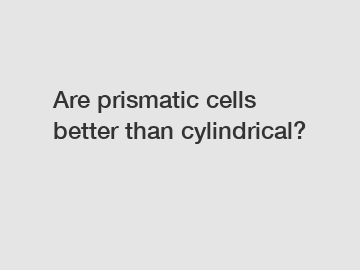Are prismatic cells better than cylindrical?
HUIYAO are exported all over the world and different industries with quality first. Our belief is to provide our customers with more and better high value-added products. Let's create a better future together.
Are prismatic cells better than cylindrical?
When it comes to choosing the right battery for your application, one of the key decisions you'll have to make is between prismatic cells and cylindrical cells. Each type has its own advantages and disadvantages, so it's important to understand the differences between the two before making a decision. In this article, we will discuss the characteristics of prismatic cells and cylindrical cells to help you determine which is better suited for your needs.

Prismatic Cells.
Prismatic cells are rectangular or square-shaped cells that are known for their high energy density and power output. These cells are typically used in applications where space is limited, such as in electric vehicles and portable electronic devices. Prismatic cells can be stacked together to maximize the use of space within a battery pack, making them a popular choice for manufacturers looking to create compact and lightweight products.
One of the main advantages of prismatic cells is their modular design, which allows for easy assembly and customization. This means that manufacturers can easily tailor the size and shape of the battery pack to fit the specific requirements of their application. Additionally, prismatic cells tend to have better thermal conductivity compared to cylindrical cells, which can help with heat dissipation and overall battery performance.
Cylindrical Cells.
Cylindrical cells, on the other hand, are the more traditional type of battery cell and are commonly used in applications such as consumer electronics and power tools. These cells are cylindrical in shape and are generally smaller in size compared to prismatic cells. While cylindrical cells may not have the same energy density as prismatic cells, they are known for their robust construction and longer cycle life.
One of the main advantages of cylindrical cells is their reliability and durability. These cells are less prone to damage from external factors such as vibrations or impacts, making them a popular choice for applications that require a high level of resilience. Additionally, cylindrical cells tend to have a lower self-discharge rate compared to prismatic cells, which can extend the overall lifespan of the battery.
Choosing the Right Cell for Your Application.
When deciding between prismatic cells and cylindrical cells, it's important to consider the specific requirements of your application. If space is limited and you need a battery pack that is compact and lightweight, prismatic cells may be the better choice. On the other hand, if durability and reliability are top priorities, cylindrical cells may be a more suitable option.
Ultimately, the decision between prismatic cells and cylindrical cells will depend on a variety of factors, including your application's power requirements, size constraints, and budget. It's recommended to consult with a battery expert to help you determine the best cell type for your needs.
Conclusion.
In conclusion, both prismatic cells and cylindrical cells have their own unique advantages and disadvantages. Prismatic cells are ideal for applications that require high energy density and power output, while cylindrical cells are well-suited for applications that require durability and reliability. By understanding the differences between the two cell types and considering your specific requirements, you can make an informed decision on which type of cell is best for your application.
Contact us.
If you have any questions or would like further information on prismatic cells and cylindrical cells, please do not hesitate to contact us. Our team of experts is here to help you choose the right battery solution for your needs.
Please visit our website for more information on this topic.
Want more information on pouch lithium battery battery pack assembly? Feel free to contact us.

